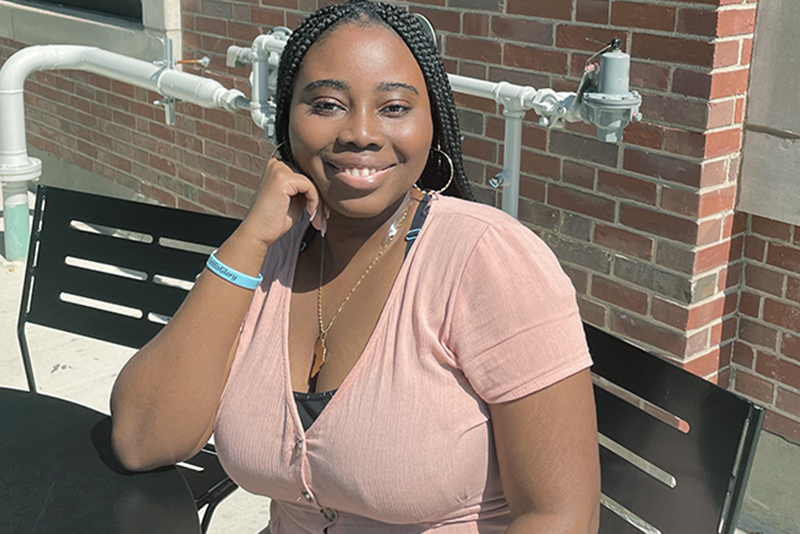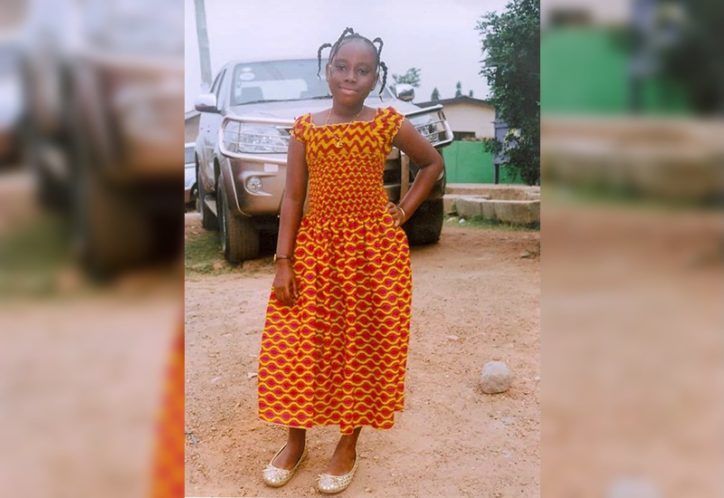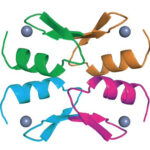How growing up with sickle cell disease is shaping Nancy’s future

Imagine appearing completely healthy while managing a life-threatening condition. Most people who meet Nancy Blankson would never know she has sickle cell disease (SCD). Her symptoms are not easily visible. It’s a challenge she lives with every day along with periodic pain crises, which at times, she says, can be virtually unbearable. Nevertheless, the 20-year-old University of Massachusetts Amherst junior has chosen to turn negativity into positivity. She intends to pursue a career in medicine so she can offer the same kind of support and encouragement she receives from the Sickle Cell Disease Program team at Dana-Farber/Boston Children’s Cancer and Blood Disorders Center.
“They make me feel like I am more than just someone with sickle cell disease,” she says.
Navigating pain
Born in Ghana, West Africa, Nancy was diagnosed with SCD when she was 5 years old. SCD is an inherited blood disorder in which red blood cells contort into a C-shape, similar in appearance to a farm tool called a sickle. These sickle-shaped cells block small blood vessels, decreasing oxygen delivery to the tissues and causing excruciating pain.
“When I was living in Ghana, I used to get pain crises frequently, which is odd, because it’s hot there and cold weather seems to be a trigger. Now, living in Massachusetts, I have them less frequently, but when they do come it’s much more intense.”

The definition of a crisis, courtesy of a Merriam-Webster, is “a difficult or dangerous situation that needs serious attention.” That just about sums up how Nancy describes the pain she experiences during a sickle cell crisis. “It starts gradually. At first, it seems like something you can handle and then it becomes intolerable — sharp stabbing pains with each breath I take.”
She says, the pain can last a day or two, and even up to a week. It means hot compresses, round-the-clock medication, and her latest home remedy — green tea, which, she finds, relaxes her. “Wow, that must be the miracle drug,” jokes Nancy’s hematologist, Dr. Matt Heeney, director of the Dana-Farber/Boston Children’s Sickle Cell Program.
Dr. Heeney has been Nancy’s sickle cell doctor since she was 12, coinciding with her family’s arrival in the U.S. She’s been fortunate to have only three pain crises during that time. “Pretty good for someone with sickle cell disease,” she says. She credits her good health to eating right, sheer luck, and her sickle cell team.
Support beyond SCD
The sickle cell team has not only helped Nancy manage her condition and tackle the pain crises, they’ve also helped her understand her condition. “I remember when I first started going to Dr. Heeney,” recalls Nancy. “He would ask me, ‘Do you know what sickle cell is? Do you know what’s happening within your blood?’ And if I answered incorrectly, he’d let me know.”

Over the years, Nancy has become more curious about the medical field. In 2019, her curiosity led her to an OB/GYN shadowing experience at Brigham and Women’s Hospital, which Claire Welch, a Sickle Cell Program social worker, helped facilitate. The experience further solidified Nancy’s motivation to become a physician. “Words cannot describe how grateful I am for that experience.”
Both Dr. Heeney and Welch have championed Nancy’s academics as well. They wrote a recommendation in support of her application for the Baccalaureate MD Pathway Program at University of Massachusetts Medical School, the first phase of which she attended this spring.
Becoming an MD
Aside from her work as a mentor in UMass Amherst’s Future Health Leaders Network, as a study leader with the Brothers and Sisters in Christ group, and as a Conversation Partner for the Five College Consortium, where she creates lesson plans to educate others about her Ghanaian culture, Nancy is already setting her sights on medical school.
Whether she will pursue hematology, or obstetrics and gynecology is unclear. What is clear is this: “She will be an excellent health care provider,” says Dr. Heeney. “She displays both intelligence and empathy.” Welch couldn’t agree more. “At her core, Nancy is enthusiastic to learn and committed to giving back.”
If she does pursue hematology, Nancy is fairly certain she would want to help others with sickle cell disease. “I feel like, through my own experience, I’d be able to understand them even better and see them as a whole — like Dr. Heeney and Claire do for me.”
Learn more about the Sickle Cell Disease Program.
Related Posts :
-

Tough cookie: Steroid therapy helps Alessandra thrive with Diamond-Blackfan anemia
Two-year-old Alessandra is many things. She’s sweet, happy, curious, and, according to her parents, Ralph and Irma, a budding ...
-

Blood across our lifetimes: An age-specific ‘atlas’ tells a dynamic story
The stem cells that form our blood, also known as hematopoietic stem cells (HSCs), are with us throughout our lives. ...
-

A small act of kindness: Blood donations get Sadie off the sidelines after her aplastic anemia diagnosis
In March of 2024, Sadie’s life was interrupted. A busy high school senior with classes to attend, soccer matches to ...
-

Could a pill treat sickle cell disease?
The new gene therapies for sickle cell disease — including the gene-editing treatment Casgevy, based on research at Boston Children’s ...





